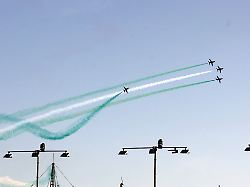Despite attack in the debut race
Formula 1 sells to Saudi Arabia
03/17/2023 10:54 am
Formula 1 hosts pay millions to the racing series to host Grand Prix. Saudi Arabia is particularly financially strong – far beyond the entrance fee. The country consistently disregards human rights. Formula 1 seems to look primarily at the money.
Clouds of smoke rose into the sky, the smell of burning oil hung in the air. Lewis Hamilton just wanted to go home, the uncertainty was palpable in Formula 1 – in the end, of course, it was still driven. Almost exactly a year ago, the rebel attack on a refinery not far from the track shook the Grand Prix in Saudi Arabia, it was the big, the visible excitement of the race weekend.
And yet the security situation on site is only a side issue when it comes to criticism of what is probably the most controversial race on the calendar. The human rights violations in the country may be invisible around the Jeddah Corniche Circuit, but the situation remains “miserable”, not only according to Human Rights Watch in the run-up to the World Cup on Sunday (6 p.m. / Sky and in the live ticker on ntv. en). Saudi Arabia continues to be a “global outlier” in this regard.
However, Formula 1 does not doubt its guest appearance in Jeddah, the role it plays for the country is quite obvious: image politics thanks to world-famous stars, it’s called sports washing – the other side of this business relationship is not quite as obvious: Is it Formula 1 gradually dependent on all the money from Saudi Arabia?
The state is to transfer almost 50 million euros in entry fee to Formula 1 every year. At best, Qatar and Azerbaijan can come close to keeping up, the British magazine “MotorSport” recently calculated that. Traditional European races don’t even break the 20 million mark, the German routes have long since stopped at these sums.
FIA muzzles Formula 1 drivers
And the race bonus is just part of the money flowing out of Saudi Arabia. Since 2020, Saudi Aramco has been one of the premium sponsors of Formula 1, the world’s largest oil producer is state-owned, it is supposed to transfer almost 430 million euros in ten years – overall, Saudi Arabia should now be the largest donor to Formula 1.
That brings influence that the state has long secured for itself in other sports, such as football or boxing. Anyone who asks about the complicated business relationship in Formula 1 will receive proven answers. You can have a positive influence in these countries, says CEO Stefano Domenicali, which is more effective than staying away.
The problem is named by Joey Shea, an expert on Saudi Arabia at Human Rights Watch. “When Formula 1 comes into a country with a terrible human rights record and doesn’t say anything, then it’s not neutral,” Shea told the Guardian, “then it’s actively helping to whitewash the problems.” And in fact, the racing series does not name any grievances, on the contrary. It was only last winter that the world association FIA once again referred to its current regulations: Political statements by drivers are undesirable.
And almost all pilots were silent on Thursday in Jeddah whenever things got critical. Even Lewis Hamilton, something like the social and societal conscience of Formula 1, initially wanted to leave it at hints. And then spoke a little more extensively. “When sport goes to places like this, with human rights issues, then we have to raise awareness,” he said. “I think sport needs to do more.”
